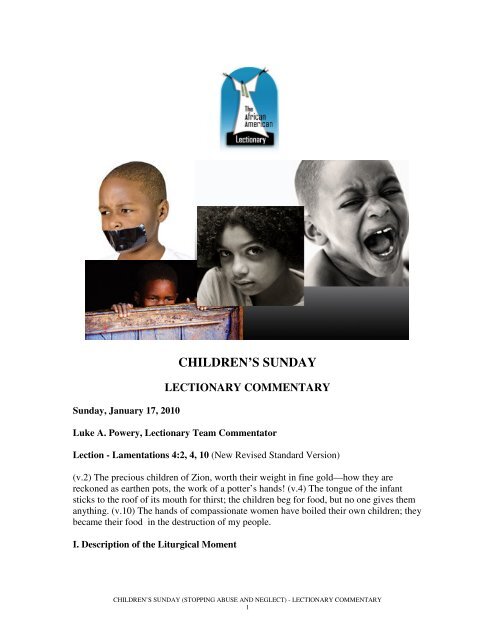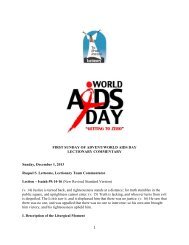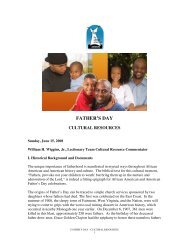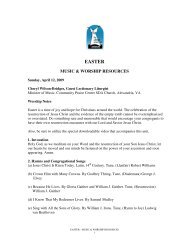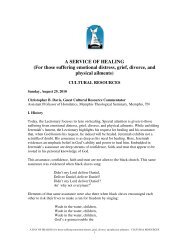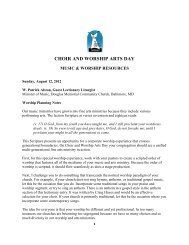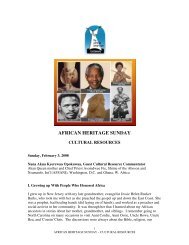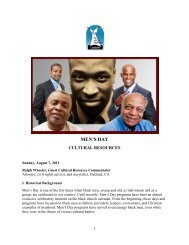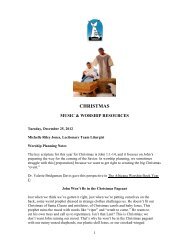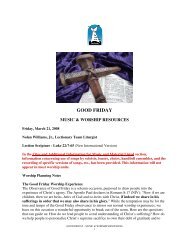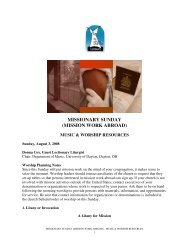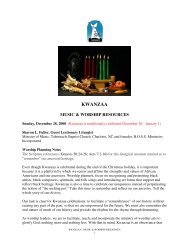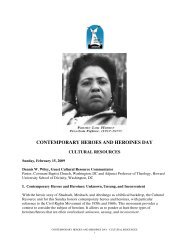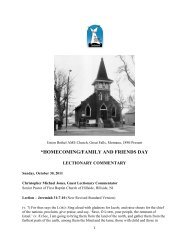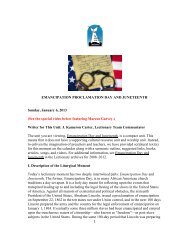CHILDREN'S SUNDAY - The African American Lectionary
CHILDREN'S SUNDAY - The African American Lectionary
CHILDREN'S SUNDAY - The African American Lectionary
You also want an ePaper? Increase the reach of your titles
YUMPU automatically turns print PDFs into web optimized ePapers that Google loves.
Sunday, January 17, 2010CHILDREN’S <strong>SUNDAY</strong>LECTIONARY COMMENTARYLuke A. Powery, <strong>Lectionary</strong> Team CommentatorLection - Lamentations 4:2, 4, 10 (New Revised Standard Version)(v.2) <strong>The</strong> precious children of Zion, worth their weight in fine gold—how they arereckoned as earthen pots, the work of a potter’s hands! (v.4) <strong>The</strong> tongue of the infantsticks to the roof of its mouth for thirst; the children beg for food, but no one gives themanything. (v.10) <strong>The</strong> hands of compassionate women have boiled their own children; theybecame their food in the destruction of my people.I. Description of the Liturgical MomentCHILDREN’S <strong>SUNDAY</strong> (STOPPING ABUSE AND NEGLECT) - LECTIONARY COMMENTARY1
In some ways, to have a designated “children’s Sunday” suggests that children do notnormally play a prominent role in Sunday worship services in many <strong>African</strong> <strong>American</strong>congregations. For instance, we do not have “adult Sunday” because adults are already acore constituency of any worship service. Thus, on this Sunday, we affirm the presenceand involvement of children in the Church in an age when many children are beingabused and neglected. On this Sunday, the Church says children matter to us and to Godby having children play a vital role in the service. Children are in leadership on this dayand have voice—singing, praying, ushering, reading scripture and poetry, creatingartwork, and testifying, etc.; they are present in a very visual and aural/oral way. <strong>The</strong>y arenot silenced and are visible, because they have gifts and worth as shown by theirinvolvement. <strong>The</strong>y are a crucial component of the Church. <strong>The</strong>y are not dismissed out ofworship to their place (e.g., children’s church or Sunday school) but they are given aplace in the space where God’s people worship, affirming that they too have worth justbecause they are created in the image of God.II. Biblical Interpretation for Preaching and Worship: Lamentations 4:2, 4, 10Part One: <strong>The</strong> Contemporary Contexts of the InterpreterI was nurtured in a loving home by a mother and father. I was the last child, the baby. Iwas given attention and affirmed over and over again. As I look back, this experience is agift from God because all parents or guardians are not like mine. <strong>The</strong>re are some parentswho are perpetual punishers. I don’t mean a periodic spanking. I mean ongoing black andblue abuse of little black innocent bodies. A beating becomes a “beating up.” Whensomeone does this, a child is viewed as subhuman and not worthy of human respect.<strong>The</strong> National Child Abuse and Neglect Data System (NCANDS) reported an estimated1,530 child fatalities in 2006 due to abuse or neglect. This translates to a rate of 2.04children per 100,000 children in the general population. <strong>The</strong> younger they are, the morevulnerable they are. <strong>The</strong> tiny ones are mostly terrorized and it is one or both parents whoare responsible for about 76% of these cases. 1 Because of these statistical facts, my heartbreaks as a parent. To think that of the 1.39 million people involved in forced commercialsexual exploitation 40–50 % are children baffles and angers me. 2 Why an innocent child?<strong>The</strong>y have worth and are wonderful gifts from God.What these statistics show us is that Jesus may love the little children of the world, butsome humans demonstrate by their actions that they do not. Children need advocates tosay “Stop the abuse,” because children are “worth their weight in fine gold.” We mustlament the fact of child abuse and in doing so cry out with deeds with love for children.Part Two: Biblical Commentary<strong>The</strong> Hebrew poet of Lamentations is crying out with grief as he copes with a crisis. Atleast he cries out and does not remain silent. He expresses his grief in five poems and thisis what we should do in regards to child abuse—grieve and do it loudly. <strong>The</strong> poet mournsthe fall of Jerusalem in 587 BC. It is a total disaster; thus, he laments for “the preciousCHILDREN’S <strong>SUNDAY</strong> (STOPPING ABUSE AND NEGLECT) - LECTIONARY COMMENTARY2
children of Zion” who were once “worth their weight in fine gold” (v.2). <strong>The</strong> city isdesolate and there is much anger. God is questioned because of this reality but in themiddle of the book, the poet confesses that the steadfast love of the Lord never ceases(3:22-23). However, in chapter 4, a clear picture of the catastrophe is painted. <strong>The</strong>re is nosense of love from God and no obvious love for the children.<strong>The</strong> fall of Jerusalem has been devastating to many parties. Children are thirsty andhungry (v.4). No one shares a drink or food. Everyone is out for themselves. Even thepreviously wealthy and noble classes are experiencing a lack of nourishment (vv.5, 7-8).And worse yet, “compassionate women” boil their own children for a satisfying meal(v.10). Helpless children are devoured by hurting people in exile. Life is so bad that eventhe compassionate ones become uncaring cannibals. Children, who were at the bottom ofthe social pyramid, end up at the bottom of someone’s stomach. If this isn’t abuse at itsworst, I do not know what is. Some may debate the historical accurateness of theseverses, but what the poet does is depict artfully and imaginatively the psychological stateof those who were living in these disastrous times. Life was death for many, especiallychildren. Life was no “crystal stair” 3 and was a serious scare for innocent children. <strong>The</strong>yhad no power and were being devoured. <strong>The</strong>y were obviously viewed as worthlesscreatures.Today, children continue to be abandoned in garbage dumpsters and left to die, producedbut not cared for and devoured and consumed for others’ own selfish purposes. <strong>The</strong>y didnot ask to come into this world, and if they are brought into this world they must be caredfor and loved as children of God. We must teach them the words of this poem, “I hear theangel say, ‘I am God’s child’.” 4 <strong>The</strong>y should not be begging nor boiling (vv. 4, 10).“Rough side of the mountain” times will come, just as in Lamentations, but childrenshould not be sacrificed on the altar of our suffering. <strong>The</strong>y are God’s creation and are ofworth, created in the image of God like every other human being. In addition, whenchildren cannot receive appropriate healthcare, education, or nutrition, they are also beingneglected. <strong>The</strong>y may be breathing, but they are dying, when we mistreat them physically,psychologically, emotionally, and spiritually. How can we do this when they are “worththeir weight in fine gold?” How can we do this when they are “God’s children?”<strong>The</strong> lamenting poet demonstrates what can happen when we forget that children aregolden. He is truthful and honest in his depiction of disaster. By doing so, he implicitlyencourages us to give voice to our contemporary plight and the abuse of children. This isa great resource in times of crises. We can name the painful reality but then we must cryout for those who have been silenced and mistreated. <strong>The</strong> treatment of children then andnow should tear us apart and lead us to protest against any form of child abuse andneglect, for these are “God’s children.” That in itself gives them worth. 5ChallengeGod created children and they are worth their weight in fine gold. <strong>The</strong>y are God’screation. We must cry out against child abuse and neglect. If we lament child abuse, weCHILDREN’S <strong>SUNDAY</strong> (STOPPING ABUSE AND NEGLECT) - LECTIONARY COMMENTARY3
are saying we love children. If we do not lament it, we are culpable for the abuse.Children are precious in God’s sight and we are called to treat them as such.Descriptive Details<strong>The</strong> descriptive details in this passage include:Sounds: Children begging for food; the screams of children being boiled;Sights: Gold; earthen pots; thirsty infants with tongues sticking to the roofs of theirmouth; women’s hands as they devour children;Smells: <strong>The</strong> smell of the flesh of boiling children; andTextures: <strong>The</strong> smooth texture of gold; the grimy feel of pottery being made; and thecomforting feel of the hands of compassionate women.III. Sermonic and Liturgical SuggestionA helpful resource about children and for children is Marian Wright Edelman’s GuideMy Feet: Prayers and Meditations for Our Children. Harper Paperbacks, 2000. Some ofthe prayers and meditations may be used throughout a sermon or could be usedthroughout other aspects of the worship service for this day. Other works by Edelmanmay also be aids for reflection as one prepares for this special children’s Sunday.Notes1. For more statistical information about child welfare, see see U.S. Department ofHealth and Human Services. Child Welfare Information Gateway. Children'sBureau/ACYF online location: http://www.childwelfare.gov/pubs/factsheets/fatality.cfmaccessed 5 October 2009. One organization that is doing significant work in the area ofchild welfare is <strong>The</strong> Annie E. Casey Foundation. For more about their online location:http://www.aecf.org/OurWork/ChildWelfarePermanence.aspx accessed 5 October 20092. For more facts on children internationally please see see UNICEF’s online locationhttp://www.unicef.org/media/media_35903.html accessed 5 October 20093. For this poetic reference, see Langston Hughes’ poem “Mother to Son.”4. This is a refrain in the poem “I Heard the Angel Say I am God’s Child” written by myfather, the Reverend W. Byron Powery.5. I am thankful for the insights of David J.A. Clines, Emeritus Professor at theUniversity of Sheffield, for his reflections on this passage. For his work, seehttp://www.shef.ac.uk/bibs/DJACcurrres/Lam.html accessed 5 October 2009CHILDREN’S <strong>SUNDAY</strong> (STOPPING ABUSE AND NEGLECT) - LECTIONARY COMMENTARY4


